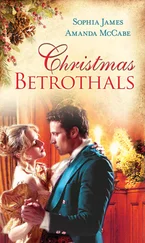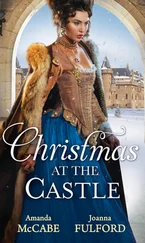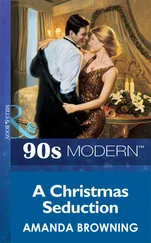“And, lo, the angel of the Lord came upon them,” read the vicar, “and the glory of the Lord shone round about them: and they were sore afraid.”
Mr. Barlow pushed a lever and a second spotlight picked out Miranda Morrow, Finch’s freckle-faced, wholesome-looking witch, rising from the palm tree’s uppermost fronds. Miranda’s strawberry-blond hair had been crimped to form a berserk halo, and the wings on her back, though white, seemed more suitable to a bat than to an angel.
Able Farnham and George Wetherhead did a very good job of miming fear without budging one inch from their original, safely balanced positions. The sheep seemed unimpressed.
“And the angel said unto them…” The vicar paused.
“Fear not,” called Miranda Morrow, spreading her arms wide, “for behold, I bring you good tidings of great joy, which shall be to all people. For unto you is born this day in the city of David a Savior, which is Christ the Lord….”
I’d heard the words a hundred times before, but tears pricked my eyes nonetheless, and as the play continued, I was swept up in its magic. Nothing—not even the sight of Peggy Kitchen in a jury-rigged false beard—could rob the ancient tale of its mystery and power. I looked from Piero Hodge’s tiny bare foot, kicking vigorously in the manger, to Will and Rob, sound asleep in their cots, and felt joy rise within me. All children are children of light, I thought. All children bring hope to the world.
The players were greeted with tumultuous applause when they lined up for their bows, and the roof nearly came off of the schoolhouse when Willis, Sr., drew Lilian from her chair to stand beside him at center stage. Dick Peacock harnessed the energy by leading everyone—cast, crew, and audience alike—in an exhilarating chorus of “Hark, the Herald Angels Sing” and brought the evening to a close with a single verse of “Silent Night.”
Will and Rob had been subjected to more than enough excitement for one day, so Bill and I sent them home with Francesca before accompanying our out-of-town guests to Anscombe Manor. With typical fickleness, the winter wind had changed from bitter to balmy during the course of the play, and the sky had begun to clear. By the time we reached the manor house, a single star shown brightly above the stable, where young Christopher Anscombe had spent the happiest days of his childhood.
“You and I should learn to ride,” I said to Bill, as we tramped through the snow to the manor house’s courtyard entrance. “The boys too, when they’re old enough.”
“Me, on a horse?” Bill leered at me with mock suspicion. “After my insurance, eh?”
I laughed. “It’s someone else’s insurance I’m thinking of. I’ll fill you in later.”
Emma and Derek had prepared a feast as bountiful as the one my neighbors had laid on at the cottage. The great hall was hung with greenery and lit with candles, and when the play’s cast arrived to celebrate their triumph, they were greeted with a rousing cheer. Bill and I drank from the wassail bowl, sampled the Christmas pudding, and mingled happily before bidding our guests good night and heading home.
“Do I have you to thank for bringing Christmas to the cottage?” I asked, as we pulled into the drive.
“Not guilty,” Bill proclaimed, eyeing the deformed robins clinging to the trellis. “Father let it be known that you were off helping Kit Smith and the villagers took it from there. They were at it all night in the kitchen, and they spent all morning desecrating—er, I mean, decorating —the cottage.”
“It’s not what I had planned.” I thought of the hard work and the enormous kindness that had gone into the appalling display, and sighed happily. “It’s much better.”
We linked arms as we strolled up the snow-covered flagstone path, and when we reached the doorway, I looked hesitantly up at my husband.
“Bill,” I said, “I know you want to hear about the amazing journey I’ve been on, but… there’s someone else I need to talk to first.”
Bill tapped his wristwatch. “I’ll give you a half hour,” he said. “Then I’m coming in after you.” He bent down to kiss me soundly before adding, “Tell Dimity that Father Christmas sends his best.”
Reginald was waiting for me in the study. My pink bunny sat on the ottoman, backlit by the fire in the hearth, gazing expectantly at the doorway as I entered the room. I placed Kit’s carryall beside him, took Aunt Dimity’s blue journal from its place on the bookshelves, and sat in the tall leather armchair.
“I’m glad you’re here, Reg,” I said. “There’s someone I’d like you to meet.” I unzipped the carryall and took out the little brown horse, then opened the blue journal and leaned back. “His name’s Lancaster. I’m pretty sure you’re cousins.”
I looked down at the blue journal and saw a single word appear on the page in Aunt Dimity’s old-fashioned copperplate.
Christopher.
“That’s right,” I said. “Kit Smith, the tramp, is Christopher Anscombe, the boy who used to ride over from Anscombe Manor along the bridle path.”
We never called him Kit. But I should have known. Sir Miles Anscombe, the Pathfinder badge… I should have known.
“You were thinking in a completely different direction,” I told her. “You were trying to remember an airman you’d met on a base up in Lincolnshire, not a little boy who grew up next door.”
What happened to Christopher? How did such a shining child end up living as a tramp?
I ran a thumb along Lancaster’s tangled mane, then set him gently beside Reginald. “It has to do with his father.”
But Sir Miles was a
“A hero,” I broke in. “Yes, I know. He was a hero who bombed schoolhouses and churches, who killed mothers and babies and old men. And he did it all because he wanted to make the world a better place for his own children. He used evil to fight evil, and in the end he came to believe that he was evil. Dimity…” I searched for a way to soften the blow, but found none. “Four years ago, Sir Miles Anscombe committed suicide.”
A sigh seemed to drift through the room, ruffling the fire’s bright flames. So he finally succeeded.
I stared down at the page, blinking stupidly. “W-what?”
Sir Miles finally succeeded in killing himself. He’d tried several times before, at Anscombe Manor. That’s why his second wife decided to sell the place and move the family to London. She thought a change of setting would help Sir Miles settle down, but there’s only so much one can do for a man who’s bent on self-destruction.
I ran a hand through my already disheveled curls and thought a moment. “Did the children know why they moved to London?”
Felicity did. She was old enough to be told the truth, but Christopher was far too young.
“Do you think Kit ever knew about his father’s suicide attempts?” I asked.
I doubt the topic was discussed at dinner. The family was very careful of Sir Miles’ reputation. But I knew the moment he showed me his dreadful memoir that he was as potty as a tin of shrimp.
I sat bolt upright. “When did he show you his memoir?”
Years ago, before he left Anscombe Manor. When he told me that he planned to leave those horrid pictures to his son, I nearly struck him.
I gazed at Reginald, who seemed to nod in the flickering firelight, as if to confirm my growing suspicions. “Did Felicity get along with Christopher?”
She told everyone who’d listen that she loved her baby brother to distraction, but I was never taken in. She resented that child from the moment he was born. Christopher was angelic, you see, and Felicity… wasn’t. Why do you ask?
Читать дальше








